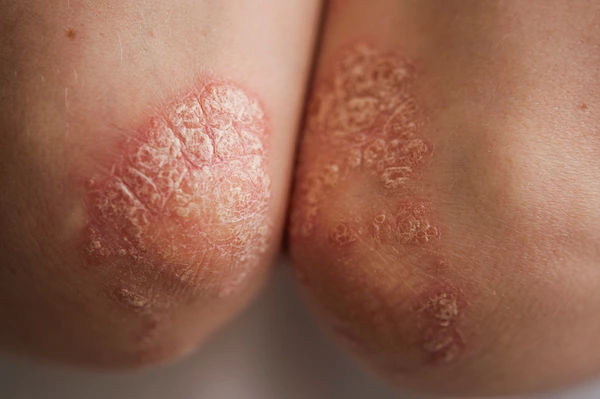Psoriasis on Neck
Understating what Psoriasis is and which type affects neck region. Learning about its potential causes, clinical symptoms, diagnosis and possible treatment and prevention options.

Written by Dr Sonia Bhatt
Last updated on 13th Jan, 2026
Psoriasis is a common and noncontagious skin condition that can manifest in various forms. The main subtypes include plaque psoriasis, inverse (or skin fold) psoriasis, guttate psoriasis, erythrodermic psoriasis, and pustular psoriasis.
Guttate psoriasis typically appears on the arms, legs, and trunk. It can become more widespread and may also affect areas such as the face, neck, and scalp.
What is Guttate Psoriasis?
Guttate psoriasis is a less common form of psoriasis that is often associated with untreated streptococcal infections, although other triggers may also contribute. It is characterized by small, raised, and scaly spots. The name "guttate" comes from the Latin word for "drop," describing the drop-like appearance of the lesions. This subtype of psoriasis is rare, making up less than 30% of all cases, and is most frequently seen in children and individuals under 30 years old.
How To Differentiate Guttate Psoriasis?
Guttate psoriasis is less common than plaque psoriasis, the most prevalent form of psoriasis, which typically persists throughout a person’s life. Plaque psoriasis is characterized by large, scaly patches that form plaques, whereas guttate psoriasis presents as smaller red or pink spots, which may not always be scaly. These spots are often surrounded by healthy skin.
Unlike plaque psoriasis, guttate psoriasis often resolves on its own within a few weeks without requiring treatment. However, around one-third of individuals may experience persistent symptoms that develop into a more chronic condition.
Symptoms of Psoriasis on Neck
It appears as round or teardrop-shaped spots. On lighter skin tones, these spots are typically pink or red, while on darker skin tones, they may appear purple or brown. The patches are usually small, measuring 2 to 10 millimetres in diameter, and may have dry, peeling scales. They most commonly appear on the arms, legs, and torso.
These patches are often accompanied by itching and irritation, which can cause additional discomfort.
Consult Top Dermatologist
Causes of Psoriasis on Neck
Two key factors are commonly associated with the development of guttate psoriasis:
Genetics: Psoriasis has a strong genetic component and individuals with family members—particularly parents—who have chronic psoriasis are more likely to develop this condition themselves.
Bacterial Infections: Guttate psoriasis is often triggered by infections caused by Group A Streptococcus, a common cause of strep throat and related illnesses.
Additionally, people with conditions that affect their immune system, such as HIV, autoimmune disorders (e.g., rheumatoid arthritis), or those undergoing treatments like chemotherapy, may face a higher risk of developing guttate psoriasis.
Other potential triggers include:
Upper respiratory infections
Sinus infections
Influenza (flu)
Tonsillitis
Stress
Skin injuries, such as cuts, burns, or insect bites
Certain medications, including antimalarial and beta-blockers
Alcohol consumption
Sunburn
Managing these risk factors and triggers can also help reduce the likelihood of flare-ups.
How Does Psoriasis on the Neck Get Diagnosed?
Clinicians can diagnose it by visually inspecting the affected areas of the skin. To confirm the diagnosis or identify potential triggers, they may recommend the following tests:
Skin Biopsy: A small sample of skin is removed and examined under a microscope to confirm the presence of guttate psoriasis and rule out other skin conditions.
Throat Swab Culture: This test checks for the presence of bacteria, particularly Group A Streptococcus, which is commonly associated with guttate psoriasis. It is used to identify strep throat or related infections.
Blood Tests: These tests detect immune system markers that indicate a current or recent bacterial infection. Such tests, often referred to as “titers,” can help determine whether an infection might have triggered the psoriasis flare or not.
Treatment and Management Strategy for Psoriasis on Neck
There are several treatment options available for guttate psoriasis, and your healthcare provider can help determine the most suitable approach based on the severity of your clinical condition.
1. Treatment for Mild Guttate Psoriasis
Over-the-counter cortisone creams: Reduces itching and swelling
Dandruff shampoos: Treats scalp involvement
Coal tar lotions: Soothes irritated skin
Moisturisers: Prevents dryness and maintains skin hydration
Prescription vitamin A creams or ointments: Helps reduce inflammation and scaling
2. Treatment for Moderate to Severe Guttate Psoriasis
Corticosteroids: Controls inflammation and reduces symptoms
Biologic treatments: Such as guselkumab and ixekizumab, which target specific components of the immune system
Apremilast: Oral medication which reduces inflammation
Deucravacitinib: Newer oral treatment for psoriasis
Methotrexate: A systemic medication that suppresses the immune system to reduce psoriasis severity
Phototherapy (Light Therapy): Involves exposing the skin to controlled amounts of ultraviolet (UV) light
3. Considerations for Biologics
Biologic treatments are well-established for plaque psoriasis but have been less extensively studied in guttate psoriasis. Biologics are effective for cases where guttate psoriasis has a transition into plaque psoriasis, which happens in approximately 40% of cases as reported in literature.
Discussing the benefits, risks, and expected outcomes of each treatment option with your healthcare provider can help you find the most effective strategy for managing your condition.
How Can I Prevent Psoriasis on Neck?
In addition to medical treatments, some natural remedies and lifestyle changes may help manage guttate psoriasis symptoms.
1. Natural Treatments
Sunlight: Short periods of sunlight exposure can sometimes help reduce psoriasis symptoms. However, because excessive sun exposure increases the risk of skin cancer, this should be done under the supervision of a healthcare provider.
Bath Salts: Soaking in a bath with Epsom or Dead Sea salts can help reduce inflammation and remove dead skin cells.
Coconut Oil: Applying coconut oil can soften the scales on psoriasis lesions, making it easier for topical treatments to penetrate and soothe the skin.
2. Avoiding Irritating Products
Be cautious about using soaps and other personal care products that may irritate your skin. Soaps with added fragrances, dyes, or harsh chemicals could worsen symptoms.
3. Lifestyle Approaches
Certain lifestyle changes may support overall well-being and help manage guttate psoriasis:
Nutritious Diet: Eating a balanced diet with a variety of nutrient-rich foods can support skin health and help manage psoriasis. However, no diet has been proven to cure the condition. Always consult a healthcare provider before making significant dietary changes.
Regular Exercise: Maintaining a regular exercise routine is beneficial for overall health, particularly for cardiovascular health. Exercise may also help reduce stress, which can be a psoriasis trigger.
Meditation or Yoga: Practices like meditation and yoga can help alleviate stress, which is known to trigger psoriasis flare-ups. These techniques may also provide relief from itching and irritation.
Incorporating these natural treatments and lifestyle changes can complement medical therapies and support the management of guttate psoriasis. Always consult with a healthcare provider before trying new treatments or making significant lifestyle changes.
Conclusion
Guttate psoriasis is an immune-mediated inflammatory disorder that affects arms, legs, trunk, face, neck, and scalp. It gets resolved on its own within a few weeks. While it is not considered a chronic condition, it can sometimes recur or, in rare cases, develop into plaque psoriasis.
If you notice any skin reaction that appears scaly or suspect that you may have guttate psoriasis, it’s important to contact a healthcare provider. A dermatologist can provide an accurate diagnosis and recommend the most appropriate treatment plan.
Consult Top Dermatologist
Consult Top Dermatologist

Dr. Kaushiki Hajra
Dermatologist
5 Years • MBBS, MD Dermatology, Venerology & Leprosy
Kolkata
MCR SUPER SPECIALITY POLY CLINIC & PATHOLOGY, Kolkata

Dr. Madhab Datta
Dermatologist
7 Years • MBBS, MD (DVL)
Kolkata
Dr. Madhab Datta's Clinic, Kolkata

Dr. Priyankar Misra
Dermatologist
11 Years • MBBS, MD Dermatology , Venereology & Leprosy
Kolkata
MCR SUPER SPECIALITY POLY CLINIC & PATHOLOGY, Kolkata

Dr. Kaushiki Hajra
Dermatologist
5 Years • MBBS,MD(D V & L)
Kolkata
VDC Clinic, Kolkata
(75+ Patients)

Dr. Sonal Jain
Dermatologist
9 Years • MBBS, MD Dermatology, Venerology & Leprosy
Kolkata
MCR SUPER SPECIALITY POLY CLINIC & PATHOLOGY, Kolkata
(25+ Patients)
Consult Top Dermatologist

Dr. Kaushiki Hajra
Dermatologist
5 Years • MBBS, MD Dermatology, Venerology & Leprosy
Kolkata
MCR SUPER SPECIALITY POLY CLINIC & PATHOLOGY, Kolkata

Dr. Madhab Datta
Dermatologist
7 Years • MBBS, MD (DVL)
Kolkata
Dr. Madhab Datta's Clinic, Kolkata

Dr. Priyankar Misra
Dermatologist
11 Years • MBBS, MD Dermatology , Venereology & Leprosy
Kolkata
MCR SUPER SPECIALITY POLY CLINIC & PATHOLOGY, Kolkata

Dr. Kaushiki Hajra
Dermatologist
5 Years • MBBS,MD(D V & L)
Kolkata
VDC Clinic, Kolkata
(75+ Patients)

Dr. Sonal Jain
Dermatologist
9 Years • MBBS, MD Dermatology, Venerology & Leprosy
Kolkata
MCR SUPER SPECIALITY POLY CLINIC & PATHOLOGY, Kolkata
(25+ Patients)

